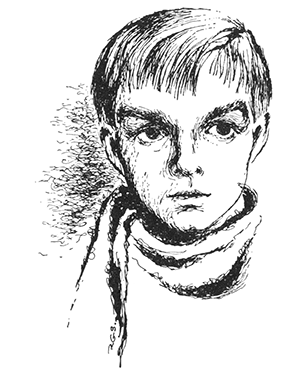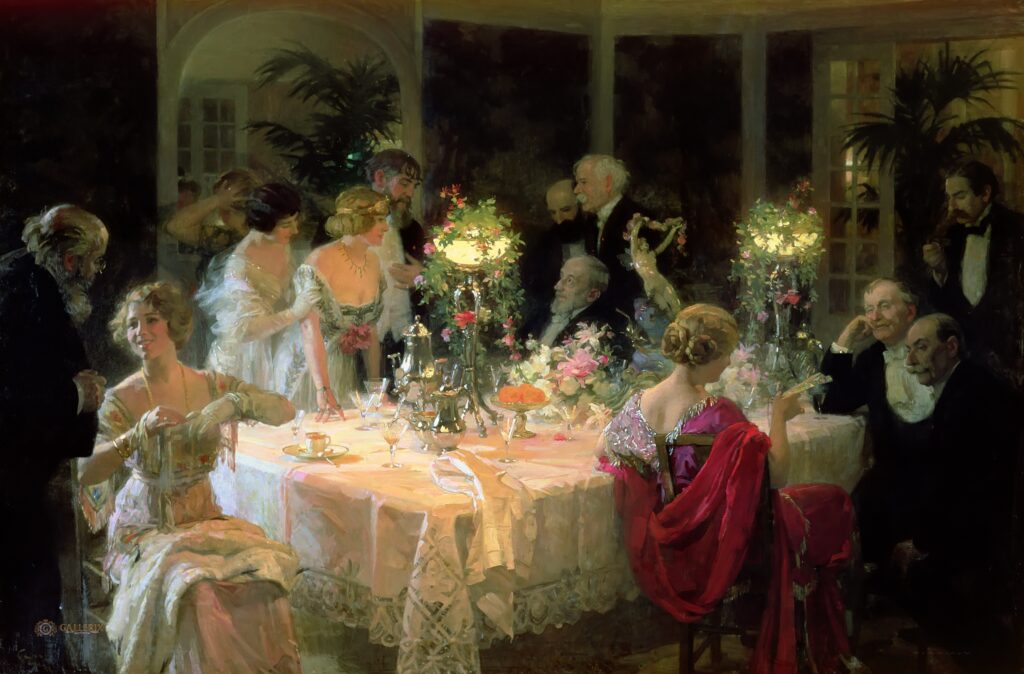Issue 16, Spring-Summer 1957
 Sketch by Rosalie Seidler, 1957.
Sketch by Rosalie Seidler, 1957.
Truman Capote lives in a big yellow house in Brooklyn Heights, which he has recently restored with the taste and elegance that is generally characteristic of his undertakings. As I entered he was head and shoulders inside a newly arrived crate containing a wooden lion.
“There!” he cried as he tugged it out to a fine birth amid a welter of sawdust and shavings. “Did you ever see anything so splendid? Well, that’s that. I saw him and I bought him. Now he’s all mine.”
“He’s large,” I said. “Where are you going to put him?”
“Why, in the fireplace, of course,” said Capote. “Now come along into the parlor while I get someone to clear away this mess.”
The parlor is Victorian in character and contains Capote’s most intimate collection of art objects and personal treasures, which, for all their orderly arrangement on polished tables and bamboo bookcases, somehow remind you of the contents of a very astute little boy’s pockets. There is, for instance, a golden Easter egg brought back from Russia, an iron dog, somewhat the worse for wear, a Fabergé pillbox, some marbles, blue ceramic fruit, paperweights, Battersea boxes, picture postcards, and old photographs. In short everything that might seem useful or handy in a day’s adventuring around the world.
Capote himself fits in very well with this impression at first glance. He is small and blond with a forelock that persists in falling down into his eyes, and his smile is sudden and sunny. His approach to anyone new is one of open curiosity and friendliness. He might be taken in by anything and, in fact, seems only too ready to be. There is something about him, though, that makes you feel that for all his willingness it would be hard to pull any wool over his eyes and maybe better not to try.
There was a sound of scuffling in the hall and Capote came in, preceded by a large bulldog with a white face.
“This is Bunky,” he said.
Bunky sniffed me over and we sat down.
INTERVIEWER
When did you first start writing?
CAPOTE
When I was a child of about ten or eleven and lived near Mobile. I had to go into town on Saturdays to the dentist and I joined the Sunshine Club that was organized by the Mobile Press Register. There was a children’s page with contests for writing and for coloring pictures, and then every Saturday afternoon they had a party with free Nehi and Coca-Cola. The prize for the short-story writing contest was either a pony or a dog, I’ve forgotten which, but I wanted it badly. I had been noticing the activities of some neighbors who were up to no good, so I wrote a kind of roman à clef called “Old Mr. Busybody” and entered it in the contest. The first installment appeared one Sunday, under my real name of Truman Streckfus Persons. Only somebody suddenly realized that I was serving up a local scandal as fiction, and the second installment never appeared. Naturally, I didn’t win a thing.
INTERVIEWER
Were you sure then that you wanted to be a writer?
CAPOTE
I realized that I wanted to be a writer. But I wasn’t sure I would be until I was fifteen or so. At that time I had immodestly started sending stories to magazines and literary quarterlies. Of course no writer ever forgets his first acceptance; but one fine day when I was seventeen, I had my first, second, and third, all in the same morning’s mail. Oh, I’m here to tell you, dizzy with excitement is no mere phrase!
INTERVIEWER
What did you first write?
CAPOTE
Short stories. And my more unswerving ambitions still revolve around this form. When seriously explored, the short story seems to me the most difficult and disciplining form of prose writing extant. Whatever control and technique I may have I owe entirely to my training in this medium.
INTERVIEWER
What do you mean exactly by “control”?
CAPOTE
I mean maintaining a stylistic and emotional upper hand over your material. Call it precious and go to hell, but I believe a story can be wrecked by a faulty rhythm in a sentence—especially if it occurs toward the end—or a mistake in paragraphing, even punctuation. Henry James is the maestro of the semicolon. Hemingway is a first-rate paragrapher. From the point of view of ear, Virginia Woolf never wrote a bad sentence. I don’t mean to imply that I successfully practice what I preach. I try, that’s all.
INTERVIEWER
How does one arrive at short-story technique?
CAPOTE
Since each story presents its own technical problems, obviously one can’t generalize about them on a two-times-two-equals-four basis. Finding the right form for your story is simply to realize the most natural way of telling the story. The test of whether or not a writer has divined the natural shape of his story is just this: after reading it, can you imagine it differently, or does it silence your imagination and seem to you absolute and final? As an orange is final. As an orange is something nature has made just right.
INTERVIEWER
Are there devices one can use in improving one’s technique?
CAPOTE
Work is the only device I know of. Writing has laws of perspective, of light and shade, just as painting does, or music. If you are born knowing them, fine. If not, learn them. Then rearrange the rules to suit yourself. Even Joyce, our most extreme disregarder, was a superb craftsman; he could write Ulysses because he could write Dubliners. Too many writers seem to consider the writing of short stories as a kind of finger exercise. Well, in such cases, it is certainly only their fingers they are exercising.
INTERVIEWER
Did you have much encouragement in those early days, and if so, by whom?
CAPOTE
Good Lord! I’m afraid you’ve let yourself in for quite a saga. The answer is a snake’s nest of No’s and a few Yes’s. You see, not altogether but by and large, my childhood was spent in parts of the country and among people unprovided with any semblance of a cultural attitude. Which was probably not a bad thing, in the long view. It toughened me rather too soon to swim against the current—indeed, in some areas I developed the muscles of a veritable barracuda, especially in the art of dealing with one’s enemies, an art no less necessary than knowing how to appreciate one’s friends.
But to go back. Naturally, in the milieu aforesaid, I was thought somewhat eccentric, which was fair enough, and stupid, which I suitably resented. Still, I despised school—or schools, for I was always changing from one to another—and year after year failed the simplest subjects out of loathing and boredom. I played hooky at least twice a week and was always running away from home. Once I ran away with a friend who lived across the street—a girl much older than myself who in later life achieved a certain fame. Because she murdered a half-dozen people and was electrocuted at Sing Sing. Someone wrote a book about her. They called her the Lonely Hearts Killer. But there, I’m wandering again. Well, finally, I guess I was around twelve, the principal at the school I was attending paid a call on my family, and told them that in his opinion, and in the opinion of the faculty, I was “subnormal.” He thought it would be sensible, the humane action, to send me to some special school equipped to handle backward brats. Whatever they may have privately felt, my family as a whole took official umbrage, and in an effort to prove I wasn’t subnormal, pronto packed me off to a psychiatric study clinic at a university in the East where I had my I.Q. inspected. I enjoyed it thoroughly and—guess what?—came home a genius, so proclaimed by science. I don’t know who was the more appalled: my former teachers, who refused to believe it, or my family, who didn’t want to believe it—they’d just hoped to be told I was a nice normal boy. Ha ha! But as for me, I was exceedingly pleased—went around staring at myself in mirrors and sucking in my cheeks and thinking over in my mind, my lad, you and Flaubert—or Maupassant or Mansfield or Proust or Chekhov or Wolfe, whoever was the idol of the moment.
I began writing in fearful earnest—my mind zoomed all night every night, and I don’t think I really slept for several years. Not until I discovered that whisky could relax me. I was too young, fifteen, to buy it myself, but I had a few older friends who were most obliging in this respect and I soon accumulated a suitcase full of bottles, everything from blackberry brandy to bourbon. I kept the suitcase hidden in a closet. Most of my drinking was done in the late afternoon; then I’d chew a handful of Sen Sen and go down to dinner, where my behavior, my glazed silences, gradually grew into a source of general consternation. One of my relatives used to say, “Really, if I didn’t know better, I’d swear he was dead drunk.” Well, of course, this little comedy, if such it was, ended in discovery and some disaster, and it was many a moon before I touched another drop. But I seem to be off the track again. You asked about encouragement. The first person who ever really helped me was, strangely, a teacher. An English teacher I had in high school, Catherine Wood, who backed my ambitions in every way, and to whom I shall always be grateful. Later on, from the time I first began to publish, I had all the encouragement anyone could ever want, notably from Margarita Smith, fiction editor of Mademoiselle, Mary Louise Aswell of Harper’s Bazaar, and Robert Linscott of Random House. You would have to be a glutton indeed to ask for more good luck and fortune than I had at the beginning of my career.




